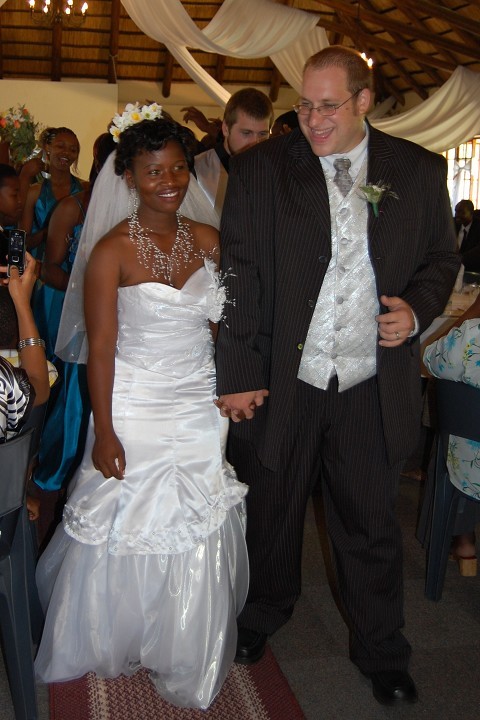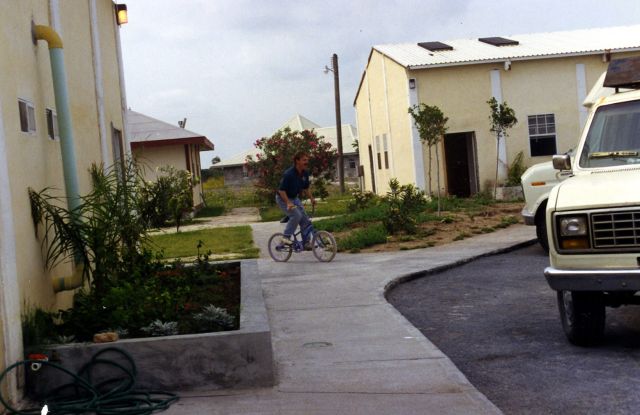

The economic gap & bad missions
 When you go as a long-term missionary to another culture, you may experience a lot of gaps that make it difficult for you to develop relationships. Just a few that come to mind:
When you go as a long-term missionary to another culture, you may experience a lot of gaps that make it difficult for you to develop relationships. Just a few that come to mind:
- Language gap
- Educational gap
- Cultural gap
- Spiritual gap
- Economic gap
- Worldview gap
But great missionaries close these gaps.
It's never easy. A highly educated, English speaking American with a postmodern worldview, for example, is going to struggle to connect with a Siswati-speaking grandma in rural Swaziland.
A good missionary has to go through a lot of training and a lot of relationship development to connect. Julie Anderson made an irrevocable commitment to Swaziland when she adopted Ellie. Dennis Brock made a similar commitment when he married Zwakele.
Some World Racers go with a heightened awareness of how different they are than their host country ministry partners. But many are relatively unaware. They may miss even basic issues of personal appearance, not understanding how their makeup, tattoos, and jewelry are percieved in more legalistic cultures.
Nevermind that their worldview may be in for an adjustment when they encounter demonic manifestations or dramatic healings.
But of all the gaps that missionaries face, perhaps the hardest one to bridge is the economic gap. There are just so many things we take for granted that are attached to the size of our paycheck and bank balance.
Erica Zeiler, an Adventures missionary in Swaziland, recently shared a story illustrating as to why this is so:
One of our ministry partners recently received a pair of shorts from the US with a price tag still hanging on them…for $9.99. In my mind, I was picturing the clearance or sale rack at a huge store & thinking how excited I would be to get a pair of shorts for only $9.99 & that those shorts were a great deal!
They started asking me how much those shorts would be in Emalangeni (Swazi currency) and I said 75 Emalangeni…they all began laughing again & the shorts soon earned the nickname "fancy pants".
My first reaction was that the shorts were on the cheaper end of the spectrum. But, for a Swazi, they would have been 6% of a well-employed person's monthly income…for a person making $7 an hour in the US, that would make the shorts about $67.
I take for granted that I can eat bread (a loaf costs about a dollar, but most families in this area can't afford it), that I could bake bread if I wanted, I could toast the bread if I wanted (I have electricity & a toaster, while most of my Swazi friends live without electricity and all of them live without plumbing), and I could even butter the bread if I wanted (refrigerators need electricity & usually you use silverware or a knife to butter bread….again things which most don't have).
Rice is a luxury here that most people can't afford. I can't begin to wrap my head around it, let alone try to imagine the type of worldview that people growing up here have.
I knew I would be dealing with the cultural gap, language gap, gender gap (because of gender roles), and the economic gap, but I'm barely beginning to scratch the surface at how broad those gaps really are & am continuing to realize how I will never truly understand what it's like to walk a mile (or kilometer) in my Swazi friends' shoes (or bare feet).
To bridge the economic gap in a developing country, you have to become poor. You have to live in the reality of those you're establishing relationship with. Many short-term missionaries, seeing the gap, try to bridge it by handing out money or gifts. But this actually takes the relationship backwards, to a place of paternalism and dependency.
Missions may at times look exotic and fun, but the reality is that it is costly. You often have to give up the things that make you comfortable. The incarnation may be great theology, but living like those you want to reach often means stripping away the trappings of First World living before putting on Third World clothes.
Perhaps you've experienced this. If so, please share your examples.



Good post, Seth. Jim and I have a lot to consider and pray about as we prepare to move to Swaziland.
Seth … GREAT WORDS with an awesome message!
May we all remember the Apostle Paul’s words … “22 To the weak I became weak, to win the weak. I have become all things to all people so that by all possible means I might save some. 23 I do all this for the sake of the gospel, that I may share in its blessings.” (1 Cor. 9:22-23)
Seth, great blog as we have left AIM office with two grand children shopping for back to school clothes!! Great Blog and thanks so much for allowing us to meet your staff. Blessings to you on this day, Frank
This is great Seth. It is also a reminder of why it is so hard for most World Racers to fit back into society afterwards. At least is was for me and my perspective has changed on how I use my money. Now when I empty my bank account, it is for one way tickets to Cambodia, etc.; and then I pray for the money to get home.
This is very true Seth. Now i understand heeding Gods call is stripping you of all the comforts you have always enjoyed. The first night we arrived in Jamaica we slept at someones place before we moved to our apartment and that same night our son was so tired so we put in bed and as i was there watching him thinking how he cuddle up his toys under his duvet in luxurious England, a giant cockroach ran straight at him and i swung into action and picked him up…i honestly really want to cry that night thinking what have i done to my son….. culture shock is also there to deal with but God has been good to us indeed. Amen
Michael – here’s what you’ve done to your son: You’ve given him the legacy of a father willing to trust God with his family and future. You’ve given him the kind of adventure that will make great stories in the future. You’ve shown him what it’s like to put kingdom before personal comfort. The cockroach is just a wee small part of the adventure.
Thanks Seth…..In Africa, we were beaten by rain so bad one day he said dad you have to carry me and so i did but guess what…i tripped and we both fell in the mud but luckily i let myself go as i tripped and landed on my butt holding tight to my son and my wife was in great shock how we both landed on the ground…but thank God we aint hurt…..I could write a book Seth on our experiences but this is it??? God is good.
Wise post and wise words to Michael.
Also, when you mentioned:
“They may miss even basic issues of personal appearance, not understanding how their makeup, tattoos, and jewelry are percieved in more legalistic cultures”
what I am finding in some younger people entering the mission field these days is it’s not merely that they miss it, but they want to miss it. If it is pointed out to them, defending their ‘right’ to have such things often outweighs the sensibilities of humbling themselves as servants even in their physical appearance.
Thankfully I see some who are willing to embrace what incarnational living is, but some of the hurdles I have to overcome as a missionary are not hurdles of the culture, but hurdles short-term missionaries left the rest of us in their wake. They may have ‘witnessed up a storm’ or ate fried cockroaches, but when they can not submit their American ideas of freedom regarding appearance, they leave a damaging legacy.
It is amazing how many American women balk at the idea of not being able to wear sleeveless shirts or shorter shorts in some of the hot weather cultures, and they like to excuse themselves with ‘Well, they know I am American, so it’s okay.’ Sure, some of the people they supposedly went there to reflect Jesus to will see beyond their attire, but why create a distraction and stumbling block to the others? Are you there to free the people from their clothing legalism or is Jesus to be the focus? By seeking Him first, He can attend to clothing issues in His order of priority.
Sometimes it’s these ‘small’ things that leave a big impact and create a ‘bad missions’ aftertaste.
Very correct Melinda. When you are called to do missions all these things don’t really matter to you…You just wanna serve God’s people and that become your only focus…isin’t it?
Seth, Thank you for your ministry,I met you today at the send-off for our daughter Ashley. Was very relieved after meeting last night and today with your team. I hope and pray I will be thanking you again after the 11 month journey! John